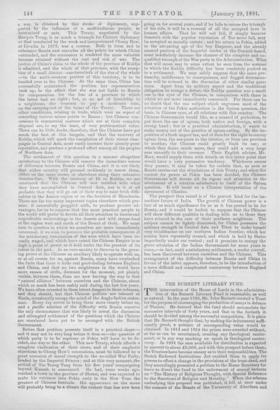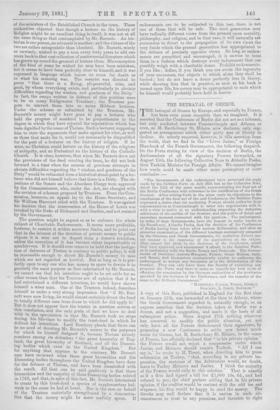THE BURNETT LITERARY FUND.
THE intervention of the House of Lords in the administra- tion of the Burnett Literary Fund is reasonable, as well as natural. In the year 1783, Mr. John Burnett created a Trust for the purpose of encouraging the production of essays in defence of Theism. He decreed that the fund should accumulate for successive intervals of forty years, and that in the fortieth it should bo divided among the successful competitors. It is plain that Mr. Burnett thought that, by making the inducement suffi- ciently great, a polemic of corresponding value would be obtained. In 1814 and 1854 the prizes were awarded without, so far as can be ascertained, creating any theological excite- ment, or in any way marking an epoch in theological contro- versy. In 1894 the sum available for distribution is expected to amount to about £6,000, and with this prospect before them, the Trustees have become uneasy as to their responsibilities. The Scotch Endowed Institutions Act enabled them to apply for powers to effect a change in the provisions of the trust-deed, and they accordingly presented a petition to the Home Secretary for leave to divert the fund to the endowment of annual lectures on " The History of Religious Thought, with Special Reference to the Sanctions of Religion and Morality." When the scheme embodying this proposal was published, it fell at once under the censure of the Senate of the University of Aberdeen and of the ministers of the Established Church in the town. These authorities objected that though a lecture on the history of Religion might be an excellent thing in itself, it was not at all the same thing as that contemplated by Mr. Burnett. An his- torian is one person, an advocate is another; and the virtues of the two are rather antagonistic than identical. Mr. Burnett, wisely or unwisely, wished to pay a man every forty years to add one more book to that vast collection of controversial literature which has grown up round the greatest of human ideas. His conception of the kind of essay he wished for may have been mistaken, but it seems to have been perfectly clear to himself, and it was expressed in language which leaves no room for doubt as to what his meaning was. The essayist was directed to prove " that there is a Being, all-powerful, wise, and good, by whom everything exists, and particularly to obviate difficulties regarding the wisdom and goodness of the Deity." In fact, the essays written in defence of this position were to be so many Bridgewater Treatises ; the Trustees pro- pose to convert them into so many Hibbert lectures. Under the scheme as submitted by the Trustees, Mr. Burnett's money might have gone to pay a lecturer who held the progress of mankind to be proportionate to the degree in which they have rejected the superstition which has been dignified by the name of Theism. Such a lecturer, supposing him to state the arguments that make against his view, as well as those that make for it, would not necessarily be disqualified for the post of a lecturer on the history of religion. If he were, no Christian could lecture on the history of the religions of antiquity, and no Protestant on the history of the Catholic Church. It is clear, however, that when Mr. Burnett drew out the provisions of the deed creating the trust, he did not look forward to a time when the success of previous attempts to obviate difficulties regarding the " wisdom and goodness of the Deity" would be estimated from a historical stand-point by a lec- turer who did not himself believe that there is a Deity. The ob- jections of the Senate and the Aberdeen Clergy were approved by the Commissioners, who, under the Act, are charged with the revision of schemes proposed by Trustees. From the Com- mission, however, an appeal lay to the Home Secretary, and Sir William Harcourt sided with the Trustees. It was against his decision that the intervention of the House of Lords was invoked by the Duke of Richmond and Gordon, and not resisted by the Government.
The question might be argued so as to embrace the whole subject of Charitable Endowments. It seems more profitable, however, to restrict it within narrower limits, and to point out that in the interest of the devotion of private money to public objects it is wise not to depart from a donor's intention, unless the execution of it has become either impracticable or mischievous. If it should ever come to be held that the instiga- tion of defences of Theism is contrary to public policy, it will be reasonable enough to divert Mr. Burnett's money to uses which are not regarded as hurtful. But so long as it is per- fectly open to any one who has money to spare to devote it to precisely the same purpose as that entertained by Mr. Burnett, we cannot see that his intention ought to be set aside for no other reason than that his Trustees are of opinion that if he had entertained a different intention, he would have shown himself a wiser man. One of the Trustees, indeed, describes himself as under a very strong impression that "if Mr. Bur- nett were now living, he would almost certainly divert the fund to totally different uses from those to which he did apply it." But it does not appear how the trustee in question arrives at this conclusion, and the only grain of fact we have to deal with in the speculation is that Mr. Burnett took no steps during his life-time to modify the trust-deed in which he defined his intentions. Lord Rosebery pleads that there can be no need of devoting Mr. Burnett's money to the purposes for which he himself designed it, because Theism already numbers among its defenders " the great hierarchy of Eng- land, the groat hierarchy of Scotland, and all the Dissent- ing bodies which exist in the United Kingdom." But for anything that appears to the contrary, Mr. Burnett may have reviewed what these great hierarchies and the Dissenting bodies throughout the United Kingdom have done for the defence of Theism, and have been dissatisfied with the result. All that can be said positively is that these hierarchies and the majority of these Dissenting bodies existed in 1783, and that, in spite of this fact, Mr. Burnett determined to create by this trust-deed a species of supplementary bul- wark to the cause he had at heart. Nor is the case on behalf
of the Trustees materially strengthened by a demonstra- tion that the money might be more usefully spent. If
endowments are to be subjected to this test, there is not one of them that will be safe. The next generation may have radically different views from the present upon morality, philosophy, and religion; and in that case, it will naturally ask permission to divert to the propagation of its own views the very funds which the present generation has appropriated to the defence of precisely opposite views. So long as endow- ments are permitted and encouraged, it is unwise to treat them in a fashion which destroys every inducement that can possibly weigh with a charitable donor. Prohibit endowments, if you like ; define, if you think you can evade the ingenuity of your successors, the objects to which alone they shall be turned ; but do not leave a donor perfectly free in theory, while showing him that in practice, as soon as his back is turned upon life, his money may be appropriated to ends which he himself would probably have held in horror.







































 Previous page
Previous page